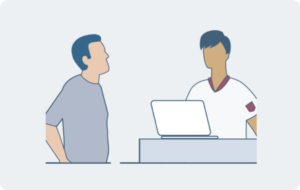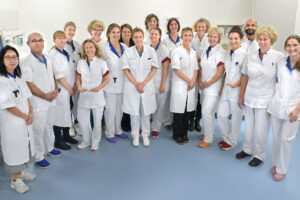When should you come in for colorectal cancer diagnostics?

Referral through the population screening program
People between 55 and 75 are invited to participate in the population screening every 2 years. When you participate, you will receive a stool test kit at home. If the lab indicates that blood was found in your stool, you will be referred for a colonoscopy. The NKI Center for Early Diagnostics offers colonoscopies and can generally see you within 2 weeks.
Referral in case of symptoms
As people age, they often develop polyps in the colon. These kinds of growths usually do not cause symptoms, but they can grow and develop into colon cancer over the years. Some symptoms that could indicate the presence of colon cancer and may be a reason to visit your general practitioner:
- Mucus or blood in your stool
- Reduced or lack of appetite
- Unexplained weight loss
- Changes in stools (harder, softer, change in frequency, unusual color)
- Abdominal discomfort (cramps, bloating, abdominal pain)
- Persistent fatigue
Your general practitioner will determine whether you should be referred for a colonoscopy. This can be done at our Center.

Our friendly health care professionals work together on early diagnostics and scientific research. You may run into them at our Center.
Blood in your stool is a sign that we need to investigate your bowels further. Blood in the stool can be harmless if it is caused by something like hemorrhoids. It can also mean that you have polyps or colorectal cancer.
A small lump can form in the lining of the colon. This is called a polyp. A polyp can be small and harmless. Most people are unaware that they have a polyp. Some polyps can grow, and new ones may appear quickly. Large polyps could develop into colorectal cancer. Removing polyps can help prevent colorectal cancer.
The intake is scheduled by the Rijksinstituut voor Volksgezondheid en Milieu (RIVM). You can only reschedule your appointment through the RIVM. There are two ways to do this:
Digitally:
Go to the population screening website and log in with your DigiD.
By phone:
A phone number for your region is provided on the confirmation letter from the RIVM.
Immediately after the intake, one of our staff members will schedule your colonoscopy for you. On average this means that you can be seen within 2 weeks.
A colonoscopy is an intestinal examination during which your specialist looks at the inside of your intestines. This is done by inserting a thin, flexible tube with a tiny camera through the anus. Air is blown into your intestines to widen the passage. This allows your specialist to view the inside of the intestines on a screen during the procedure. If your specialist finds polyps during the examination, these will be removed immediately and examined later. You won’t feel anything when the polyps are removed.
Inserting the endoscope into the anus and advancing it into the colon can cause discomfort or pain. We offer a mild sedative or pain relief during the procedure. Your nurse or nurse practitioner will discuss the options with you during your intake consultation.
You decide whether you prefer sedation during your colonoscopy. If you choose to be sedated, we will give you a calming agent that helps you feel the procedure less strongly. It is not an anesthetic: most people do not fall asleep when sedated. The sedation is administered through a small tube (IV) inserted into a vein in your hand or arm.
Advantage:
- You feel less of the procedure and are able to relax during the colonoscopy.
Disadvantages:
- You will need to stay longer at the Center after the colonoscopy to recover in the recovery room.
- You cannot perform certain activities immediately after the procedure, as the risk of errors is higher following sedation.
- You cannot be in traffic on your own, which means that you cannot bike or drive. You will need someone to take you home after the colonoscopy.
- You may feel groggy on the day of the procedure, which can make it harder to remember what the doctor or nurse tells you.
In most cases, you can watch during the colonoscopy. There is a large screen on which your physician views the inside of the intestine. Usually this screen will be positioned in such a way that you can also see the images.
If you were not sedated during the procedure, you can return to work immediately if you feel well enough for it.
If you have been sedated, you might feel a bit groggy after the procedure. If this is the case, please take it easy for the rest of the day. We do not recommend returning to work on the day of the procedure.
Immediate preliminary results:
You will receive the preliminary results of the examination immediately after the colonoscopy. The specialist will inform you whether polyps have been found, and provide an initial assessment of the likelihood of colorectal cancer.
Final results after one week:
After approximately one week, you will receive your results through a phone call. If polyps have been found, the pathologist will have had time to examine them further. This will confirm whether colorectal cancer is present.
- Extra underwear or a pad for your underwear, in case you experience any unexpected bowel movements.
- Something to eat after the colonoscopy. We will provide a piece of gingerbread, but you can also bring your own food. The NKI Center for Early Diagnostics does not have a restaurant, but there will be a snack dispenser available. The Netherlands Cancer Institute (across from our Center) has a restaurant and coffee bar.
- If you use a CPAP mask for sleep apnea and have chosen sedation, please bring your mask and use it during the procedure.
The costs of the follow-up examination are covered by your health insurance. There is a chance that you may have to pay some or all of the costs yourself. This depends on your deductible (eigen risico).
Contact your health insurer for more information about coverage.
The person who accompanied you to the appointment cannot come inside with you. They will need to wait for approximately 1 hour. They can wait in the waiting area of the NKI Center for Early Diagnostics. We do not have a restaurant, but we do have a snack dispenser available here. Your support can also visit the Netherlands Cancer Institute across the street, which has a restaurant and a coffee bar available.
